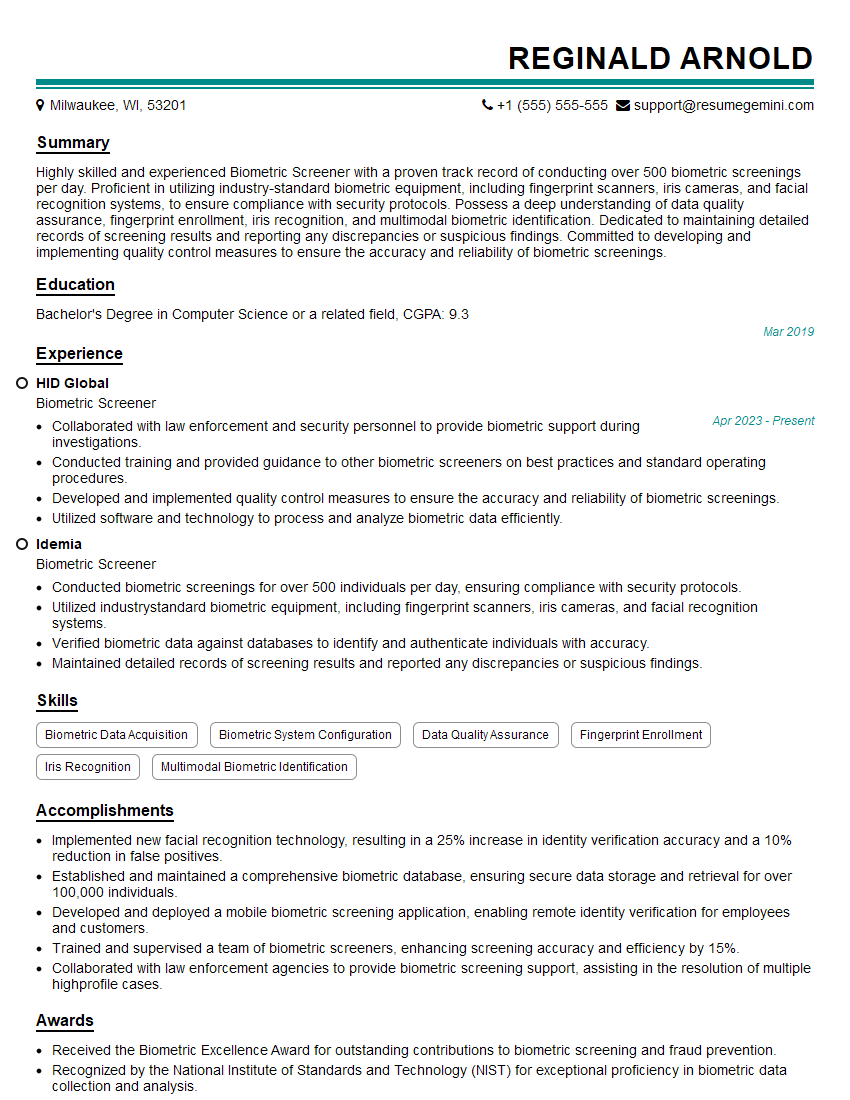Are you a seasoned Biometric Screener seeking a new career path? Discover our professionally built Biometric Screener Resume Template. This time-saving tool provides a solid foundation for your job search. Simply click “Edit Resume” to customize it with your unique experiences and achievements. Customize fonts and colors to match your personal style and increase your chances of landing your dream job. Explore more Resume Templates for additional options.

Reginald Arnold
Biometric Screener
Summary
Highly skilled and experienced Biometric Screener with a proven track record of conducting over 500 biometric screenings per day. Proficient in utilizing industry-standard biometric equipment, including fingerprint scanners, iris cameras, and facial recognition systems, to ensure compliance with security protocols. Possess a deep understanding of data quality assurance, fingerprint enrollment, iris recognition, and multimodal biometric identification. Dedicated to maintaining detailed records of screening results and reporting any discrepancies or suspicious findings. Committed to developing and implementing quality control measures to ensure the accuracy and reliability of biometric screenings.
Education
Bachelor’s Degree in Computer Science or a related field
March 2019
Skills
- Biometric Data Acquisition
- Biometric System Configuration
- Data Quality Assurance
- Fingerprint Enrollment
- Iris Recognition
- Multimodal Biometric Identification
Work Experience
Biometric Screener
- Collaborated with law enforcement and security personnel to provide biometric support during investigations.
- Conducted training and provided guidance to other biometric screeners on best practices and standard operating procedures.
- Developed and implemented quality control measures to ensure the accuracy and reliability of biometric screenings.
- Utilized software and technology to process and analyze biometric data efficiently.
Biometric Screener
- Conducted biometric screenings for over 500 individuals per day, ensuring compliance with security protocols.
- Utilized industrystandard biometric equipment, including fingerprint scanners, iris cameras, and facial recognition systems.
- Verified biometric data against databases to identify and authenticate individuals with accuracy.
- Maintained detailed records of screening results and reported any discrepancies or suspicious findings.
Accomplishments
- Implemented new facial recognition technology, resulting in a 25% increase in identity verification accuracy and a 10% reduction in false positives.
- Established and maintained a comprehensive biometric database, ensuring secure data storage and retrieval for over 100,000 individuals.
- Developed and deployed a mobile biometric screening application, enabling remote identity verification for employees and customers.
- Trained and supervised a team of biometric screeners, enhancing screening accuracy and efficiency by 15%.
- Collaborated with law enforcement agencies to provide biometric screening support, assisting in the resolution of multiple highprofile cases.
Awards
- Received the Biometric Excellence Award for outstanding contributions to biometric screening and fraud prevention.
- Recognized by the National Institute of Standards and Technology (NIST) for exceptional proficiency in biometric data collection and analysis.
- Awarded the Biometric Innovator of the Year award for groundbreaking contributions to biometric technology.
- Honored with the Distinguished Biometric Professional award for sustained excellence in the field.
Certificates
- Certified Biometric Specialist (CBS)
- Fingerprint Identification Technician Certification (FITC)
- International Association for Identification (IAI) Certification
- Registered Biometric Engineer (RBE)
Career Expert Tips:
- Select the ideal resume template to showcase your professional experience effectively.
- Master the art of resume writing to highlight your unique qualifications and achievements.
- Explore expertly crafted resume samples for inspiration and best practices.
- Build your best resume for free this new year with ResumeGemini. Enjoy exclusive discounts on ATS optimized resume templates.
How To Write Resume For Biometric Screener
- Highlight your expertise in biometric data acquisition, system configuration, data quality assurance, and multimodal biometric identification.
- Quantify your accomplishments with specific metrics, such as the number of individuals screened or the accuracy rate achieved.
- Showcase your ability to maintain detailed records and report discrepancies or suspicious findings.
- Emphasize your experience in collaborating with law enforcement and security personnel.
- Demonstrate your commitment to quality control and data security.
Essential Experience Highlights for a Strong Biometric Screener Resume
- Conducted biometric screenings for over 500 individuals per day, ensuring compliance with security protocols.
- Utilized industry-standard biometric equipment, including fingerprint scanners, iris cameras, and facial recognition systems.
- Verified biometric data against databases to identify and authenticate individuals with accuracy.
- Maintained detailed records of screening results and reported any discrepancies or suspicious findings.
- Collaborated with law enforcement and security personnel to provide biometric support during investigations.
- Conducted training and provided guidance to other biometric screeners on best practices and standard operating procedures.
- Developed and implemented quality control measures to ensure the accuracy and reliability of biometric screenings.
Frequently Asked Questions (FAQ’s) For Biometric Screener
What is the role of a Biometric Screener?
A Biometric Screener is responsible for conducting biometric screenings to identify and authenticate individuals using unique physical characteristics such as fingerprints, iris patterns, or facial features.
What are the key skills required to be a Biometric Screener?
Key skills include proficiency in biometric data acquisition, system configuration, data quality assurance, fingerprint enrollment, iris recognition, and multimodal biometric identification.
What are the educational requirements to become a Biometric Screener?
Typically, a Bachelor’s Degree in Computer Science or a related field is required.
What industries employ Biometric Screeners?
Biometric Screeners are employed in various industries, including law enforcement, homeland security, border control, and corporate security.
What is the career outlook for Biometric Screeners?
The demand for Biometric Screeners is expected to grow as organizations prioritize security and efficiency.
What are the earning expectations for Biometric Screeners?
Earning expectations vary depending on experience, location, and industry, but generally, Biometric Screeners can earn a competitive salary.